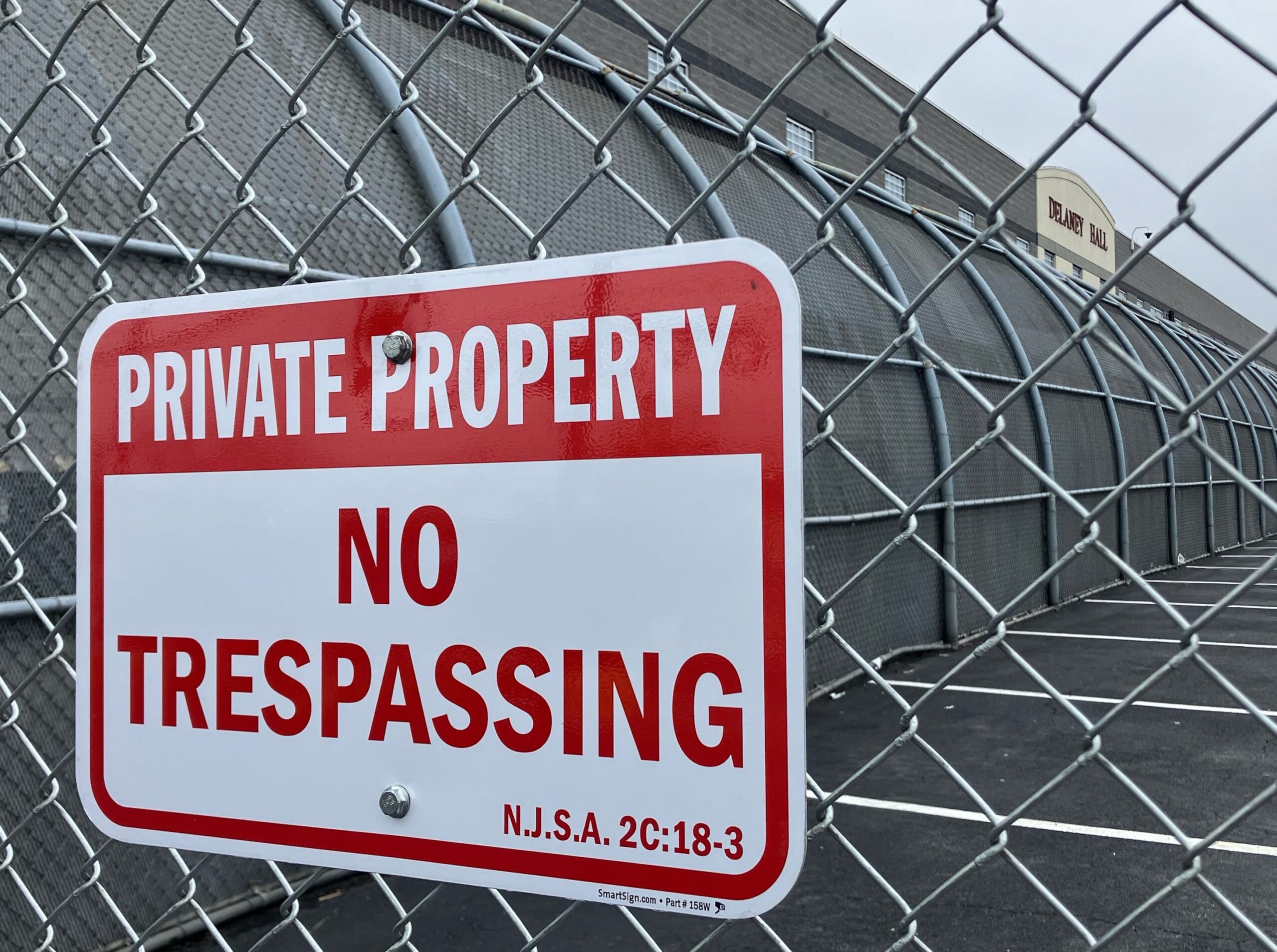The masked men appeared out of nowhere.
They descended on Alan Junior Pierre, confronting the high school junior last month as he left a routine immigration appointment in New York City.
As the men drew closer, he noticed their badges.
U.S. Immigration and Customs Enforcement.
“They just asked my name, and that was it,” Pierre told NJ Advance Media, speaking in Haitian Creole through a translator.
His father, who had been waiting outside the courthouse, wouldn’t learn his son had been detained
for some five hours.
Pierre would soon find himself in Delaney Hall, the controversial Newark immigrant detention center where
a riot broke out
June 12 involving more than 50 detainees, including four men who escaped in the chaos.
It has become a flash point in President Donald Trump’s crackdown on immigration, drawing daily protests from advocates and supporters. The uprising at the privately run detention center made national headlines just weeks after Newark Mayor
Ras Baraka
was arrested there during a congressional oversight visit.
Meager, inconsistent meals at Delaney Hall were the catalyst for the riot, one immigration lawyer told NJ Advance Media. Detainees covered security cameras and
broke through a wall
described by U.S. Sen. Andy Kim as “essentially just some drywall with some mesh inside.”
Pierre was among the dozens who have been held at the facility, which sits on Doremus Avenue in an industrial area near Newark Bay. He described tough but bearable conditions in an interview last week with NJ Advance Media, just hours after his July 9 release.
He said he was given nothing but bread and water during his first week in the detention center.
The food quality later improved, Pierre said, and he was fed three meals a day.
He had hot water for daily showers and was able to use a phone to talk to his father as well as a computer for a virtual conference call with his attorney, Vince Sykes, and Sykes’ assistant.
Other Delaney Hall detainees have complained of cramped quarters, clogged toilets and small-portioned meals, according to attorneys and immigration advocates. Sometimes breakfast wasn’t served until the afternoon, lunch until dinner time and dinner until close to midnight, they say.
One man still detained at the detention center reported being fed a small sandwich — often peanut butter or bologna — for “breakfast, lunch and dinner” for days. The detainee, speaking on the condition of anonymity, dictated his experiences in Spanish to his attorney, who translated it and shared it with NJ Advance Media.
Delaney Hall began
housing detainees May 1
and is run by GEO Group, one of the country’s largest private prison firms. It is one of two federal immigration detention facilities in New Jersey. (The other, CoreCivic, operates the Elizabeth Detention Center.)
The June 12 uprising was an isolated incident, according to GEO Group spokesperson Chris Ferreira. The company is working with ICE to investigate the matter, he added.
“The safety and security of the Delaney Hall Facility and our neighbors in the local community is our top priority, and we work collaboratively with on-site ICE personnel daily,” Ferreira said.
Allegations of “chronic food shortages at Delaney Hall are unequivocally false,” Tricia McLaughlin, a spokesperson for the Department of Homeland Security, said in a statement. A food service official had conducted “a review of food portions” at the facility, she added, and found detainees were being served meals adhering to a nutritionist’s recommendations.
Looking for a future
Pierre left Haiti amid a spiraling humanitarian crisis prompted by escalating gang violence and political instability.
The 20-year-old man — who has no criminal record, according to Sykes — crossed the southern border legally in January under a humanitarian program granting him “special parole status.”
The program was launched for those escaping war and political turmoil. Haiti is one of four countries — along with Cuba, Nicaragua and Venezuela — that fell under the Biden-era program.
“Based on the situation that’s going on in Haiti… I didn’t see a future,“ Pierre said. It’s ”one of the main reasons why I wanted to come to the United States.”
He joined his father, Dutan Pierre, a U.S. citizen who works as a school bus driver in Rockland County, New York, just over the border from Bergen County.
But the “special parole” program was effectively terminated May 30 when the U.S. Supreme Court
allowed the Trump administration
to revoke the protected status of the program’s recipients. It threw Pierre’s petition for a green card into question.
He was taken into custody June 4. He said the masked ICE agents didn’t identify themselves, nor did they tell him why he was being detained.
The controversial practice of
ICE agents wearing masks
stems from recent doxing and assaults, according to a statement in May from the Department of Homeland Security, but it has been
condemned by civil rights groups
and the New York City Bar Association.
After several days spent in a holding cell in New York, Pierre was brought to Delaney Hall. He remained there for five weeks before being released.
“There was no justification for his detention,” Sykes said.
But it appears ICE hasn’t closed Pierre’s case. He was released with a deactivated ankle monitor, according to Sykes.
“I have no idea why ICE fit him with an ankle bracelet,” the lawyer said. “I don’t think it was necessary.”
The next day, Pierre and his father reported to ICE’s Manhattan field office as directed, according to Sykes. The pair waited for three hours before being sent uptown to its Bronx center. There, his ankle bracelet was activated.
It’s not entirely clear what conditions Pierre has to comply with in order to avoid being detained again.
“He’s really not safe,” Sykes said. “He’s still vulnerable.”
For months, Pierre has been enrolled in Spring Valley High School and following the process for a green card with U.S. Citizenship and Immigration Services. The agency is distinct from ICE, but also overseen by the Department of Homeland Security.
It remains unclear whether ICE intends to pursue Pierre’s deportation or why exactly he was released. ICE did not provide a reason, according to Sykes, but the lawyer credited both U.S. Rep. Mike Lawler, the New York Republican who represents Rockland County, and Senate Minority Leader Chuck Schumer, a New York Democrat, for their efforts to help free him.
Schumer appealed directly to ICE agents in Newark, according to a spokesperson. Lawler, on the other hand, was “grateful” to the Department of Homeland Security for “working with” him to free Pierre, he said in a statement.
“It was wrong,” Lawler said Friday at a news conference. “And so I personally called Secretary (Kristi) Noem’s office, and within 36 hours, he was released.”
But McLaughlin, the Homeland Security spokeswoman, told
The Journal News
that Pierre was “an illegal alien from Haiti” who “illegally entered the U.S. on January 17” — a few days before Trump assumed office — and was “RELEASED by the Biden Administration into our country.”
McLaughlin did not respond to an NJ Advance Media request for clarification.
But a spokesperson for ICE, Chrissy Cuttita, reiterated in an email six days after Pierre’s release that he was “an illegal alien” and “currently on ICE’s Intensive Supervision Appearance Program pending his next hearing before an immigration judge.”
The program is part of what ICE calls its “Alternatives to Detention,” which the agency
describes online
as a way for “non-detained aliens” to remain in their communities “as they move through immigration proceedings or prepare for departure.”
The majority of those in the program are monitored via a mobile app, according to the webpage. As of last September, less than 10% of participants were assigned a body-worn device.
Political third rail
The inner workings of Delaney Hall largely remain a mystery.
The facility housed men and women across five units, though one closed in the aftermath of the riot, according to advocates. The units appear somewhat isolated from each other as Pierre — who was not in the wing where the riot took place, according to Sykes — was unaware of the confrontation until it was over.
An NJ Advance Media reporter who recently visited
the site was allowed past the front gate briefly by a guard before being stopped and turned away by a second guard.
One of the guards said reports of inadequate conditions were overblown.
“It’s fine. No, it’s not how people have been describing it,” he said. “I’m saying it’s a regular program.”
But the guard admitted he had never been in the detainee area. He declined to comment further.
Visits to the detention center have been heavily restricted since the June 12 riot, according to the advocates who keep a daily vigil outside Delaney Hall.
ICE’s website claims “friends and family” can visit detainees seven days a week, from 8 in the morning to 9 in the evening. But that policy doesn’t match reality, immigrant supporters say.
“We’ve watched them cut visiting hours back again and again over the last couple months,” said Kathy O’Leary, the New Jersey coordinator for Pax Christi, a non-profit Catholic peace and justice organization. “It’s down to about two hours on the weekend now.”
She also alleged that visits were capped to 15 detainees each day, prompting relatives to line up outside the facility long before the start of visiting hours.
“People sit out in the hot sun for hours,” she said. “It’s kids, pregnant women.” Advocates have started bringing umbrellas to provide shade.
The exact number of people held at Delaney Hall remains unclear. As of late May, 358 detainees were held statewide and awaiting deportation proceedings,
the highest total in 14 years
, according to a Philadelphia Inquirer report. But a portion of Delaney Hall’s population was transferred in the wake of the uprising, according to attorneys and advocates.
It
seems to
corroborate a report by a Texas news outlet that said
“dozens” of female detainees
were moved from New Jersey to “a tent-like facility in El Paso.”
In February, GEO Group secured a $1 billion contract with ICE to provide 1,000 beds over a 15-year period, it announced. Democratic officials in New Jersey have opposed its use of Delaney Hall for that purpose. The City of Newark maintains the company did not secure the proper permits. Newark filed a
lawsuit
over the matter earlier this year.
GEO Group operates between 50 and 100 facilities in the United States, according to
its website
. It has faced allegations of human rights abuses in
Pennsylvania
,
Washington
and
Louisiana
, where Columbia University student activist
Mahmoud Khalil
was held for three months after being detained by ICE earlier this year.
Delaney Hall remains a political third rail even as the riot and Baraka’s arrest fade from the headlines.
U.S. Rep.
LaMonica McIver
, who was also arrested in the May incident, called the assault charges filed against her “political intimidation.”
The trespassing charges against Baraka were later dropped.
Three men who escaped in the uprising were found and arrested within days. The fourth,
Andres Felipe Pineda-Mogollon
, 25, was still on the run as of this week, according to the FBI. Described by ICE as “dangerous illegal immigrants” from Colombia and Honduras, two have criminal histories that include aggravated assault and weapons charges. All four face
additional charges
for the escape.
Back in Rockland County, Pierre waits in limbo.
The parole program’s termination puts about
530,000 migrants
, including more than 200,000 Haitians, at risk of deportation. Still, it’s not clear how many may immediately be deported, as many have applied for green cards, asylum relief and other legal protections through an immigration court system snarled by delays.
So while Sykes works on his case, Pierre and his father are focused on getting him back on track at school. The detention caused him to miss his finals at Spring Valley, as well as the deadline to register for summer classes.
Sabrina Charles-Pierre, who translated for Pierre during his interview, is a local school board member. She told NJ Advance Media she planned to convince the district to make an exception in his case.
“We’ll see if we can get him in, and he can take the exams he needs to take by August,” she said, “so he can enter 12th grade in September.”
After graduation, Pierre wants to enlist in the U.S. military. In the immediate future, though, the people who care about him just want to ensure he recovers from his experience.
“Psychologically, he’s gone through a lot,” Sykes said.
Our journalism needs your support. Please subscribe today to
NJ.com
.
AJ McDougall may be reached at
. Follow her on X at
@oldmcdougall
. Jana Cholakovska may be reached at
.






